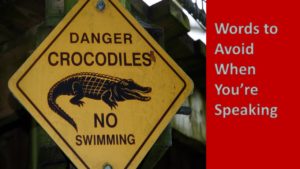Five Phrases to Avoid when Speaking
If you are a leader or hope to be a leader in your company, organization or community – your words matter. It matters what you say. It also matters what you don’t say.
Are you paying attention to your words and implications? Guess what? Your audience pays attention and draws inferences and conclusions from your words.
Here are five phrases that you need to avoid saying because they are counterproductive to your message. They can confuse or distance your listeners. People might not consciously notice these flaws, but these phrases can cause unconscious dissonance in your message.
Mind your words because they matter. Be precise and prudent with your choice of words. Remove words that are wasted, distracting or annoying. Note these phrases and avoid these words.
Before I begin
This is a silly phrase. If you’ve started speaking, you’ve already begun. If you want to add a point at the beginning of your presentation., you might say, “I’ll start by saying…” or “My first message is…”
Hello everybody
This might seem like a pleasant phrase, but it simply reinforces the feeling you are talking to a crowd. That’s not an effective way to connect with individuals.
Instead, say Hello – as if you are talking to one person. That feels more personal and more believable. To create a stronger connection with your audience make them feel that you are talking directly to them as an individual.
Don’t even think about calling them “You guys”.
As I said before
When we hear this phrase, we tend to tune out because you said it before. This phrase might be perceived as an apology for repeating or a scolding. “Weren’t you listening to me?”
If you want to add emphasis to a phrase – state it, pause, then say, “I repeat” and state the phrase again.
Repeating a key phrase throughout your presentation can be effective and you don’t need to apologize every time you say it. Remember Martin Luther King and “I have a Dream”. He never once said, “As I said before”.
Obviously
How do you feel when a person speaking to you adds the word “obviously”?
Insulted? Consider how your audience might feel when they hear you say “obviously”. Avoid this word. If it’s obvious you don’t need to say it is. If it’s obvious you don’t need to remind us how unaware we are of the obvious.
State your point without the hint of sarcasm.
Thank you
Don’t end your presentation with “Thank you”.
Why? It’s a weak close and contrary to popular belief, it’s not polite.
Let’s address the fallacy that this is polite. Some speakers believe they need to say “Thank you” because they believe that their presentation was an imposition. Maybe they’re apologizing for a poor presentation.
Some speakers believe that they are thanking the audience for their time and attention. The reality is that the audience offers you time and attention for the benefit of your message.
If you delivered a valuable message to the audience, it is they who should say thank you. In a live presentation, they might do that by applauding. In a news conference or video meeting they probably won’t do that.
If you gave them value, you don’t need to say thank you.
If you want to thank them you might do that during the presentation, and you might thank them for their teamwork, adaptability or positive energy. Be specific.
The most important point is that your last words should be relevant to your message. They should be poignant and memorable. “Thank you” doesn’t serve that purpose. It’s best to leave your audience with the words that you want them to remember.
Leave them with a summary of the key points, call to action or positive reminder.
When you’re speaking, your words are critical to ensure the audience clearly receives your intended message. Choose your words purposefully and you will deliver a more effective message.
Five Phrases to Avoid when Speaking
PS: Are there more words that you should avoid when speaking? Yes. Watch for more tips.
Communication skills coaching and training.


